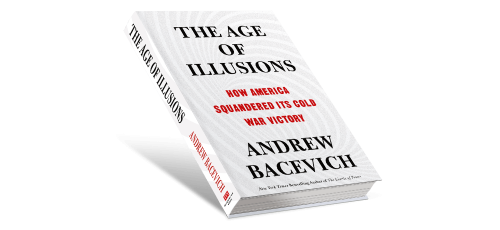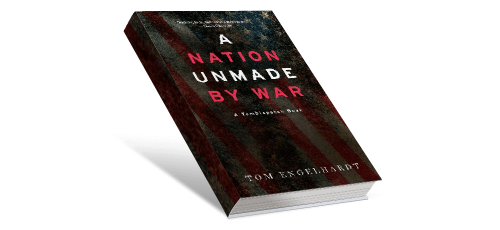
A Look Back from Mid-Century
Andrew Bacevich
From our present vantage point, it seems clear that, by 2019, the United States had passed a point of no return. In retrospect, this was the moment when indications of things gone fundamentally awry should have become unmistakable. Although at the time much remained hidden in shadows, the historic pivot now commonly referred to as the Great Reckoning had commenced.
Even today, it remains difficult to understand why, given mounting evidence of a grave crisis, passivity persisted for so long across most sectors of society. An epidemic of anomie affected a large swath of the population. Faced with a blizzard of troubling developments, large and small, Americans found it difficult to put things into anything approximating useful perspective. Few even bothered to try. Fewer succeeded. As with predictions of cataclysmic earthquakes or volcanic eruptions, a not-in-my-lifetime mood generally prevailed.
During what was then misleadingly known as the Age of Trump, the political classes dithered. While the antics of President Donald Trump provoked intense interest — the word “intense” hardly covers the attention paid to him — they also provided a convenient excuse for letting partisan bickering take precedence over actual governance or problem solving of any sort. Meanwhile, “thought leaders” (a term then commonly used to describe pontificating windbags) indulged themselves with various pet projects.

Turning 75 in the Age of Trump
Tom Engelhardt
As I turn 75, there’s no simpler way to put it than this: I’m an old man on a new planet — and, in case it isn’t instantly obvious, that’s not good news on either score.
I still have a memory of being a camp counselor in upstate New York more than half a century ago. I was perhaps 20 years old and in charge of a cabin of — if I remember rightly — nine-year-old campers. In other words, young as they were, they were barely less than half my age. And here’s what I remember most vividly: when asked how old they thought I was, they guessed anything from 30 to 60 or beyond. I found it amusing largely because, I suspect, I couldn’t faintly imagine being 60 years old myself. (My grandmother was then in her late sixties.) My present age would have been off the charts not just for those nine year olds, but for me, too. At that point, I doubt I even knew anyone as old as I am now.
Yet here I am, so many decades later, with grandchildren of my own. And I find myself looking at a world that, had you described it to me in the worst moments of the Vietnam War years when I was regularly in the streets protesting, I would never have believed possible. I probably would have thought you stark raving mad. Here I am in an America not just with all the weirdness of Donald Trump, but with a media that feeds on his every bizarre word, tweet, and act as if nothing else were happening on the face of the Earth. If only.

Oil’s Enduring Sway in U.S. Policy in the Middle East
Michael Klare
It’s always the oil. While President Trump was hobnobbing with Saudi Crown Prince Mohammed bin Salman at the G-20 summit in Japan, brushing off a recent U.N. report about the prince’s role in the murder of Washington Post columnist Jamal Khashoggi, Secretary of State Mike Pompeo was in Asia and the Middle East, pleading with foreign leaders to support “Sentinel.” The aim of that administration plan: to protect shipping in the Strait of Hormuz and the Persian Gulf. Both Trump and Pompeo insisted that their efforts were driven by concern over Iranian misbehavior in the region and the need to ensure the safety of maritime commerce. Neither, however, mentioned one inconvenient three-letter word — O-I-L — that lay behind their Iranian maneuvering (as it has impelled every other American incursion in the Middle East since World War II).
Now, it’s true that the United States no longer relies on imported petroleum for a large share of its energy needs. Thanks to the fracking revolution, the country now gets the bulk of its oil — approximately 75% — from domestic sources. (In 2008, that share had been closer to 35%.) Key allies in NATO and rivals like China, however, continue to depend on Middle Eastern oil for a significant proportion of their energy needs. As it happens, the world economy — of which the U.S. is the leading beneficiary (despite President Trump’s self-destructive trade wars) — relies on an uninterrupted flow of oil from the Persian Gulf to keep energy prices low. By continuing to serve as the principal overseer of that flow, Washington enjoys striking geopolitical advantages that its foreign policy elites would no more abandon than they would their country’s nuclear supremacy.

Why Is American Aggression Missing in Action?
Tom Engelhardt
Headlined “U.S. Seeks Other Ways to Stop Iran Shy of War,” the article was tucked away on page A9 of a recent New York Times. Still, it caught my attention. Here’s the first paragraph:
“American intelligence and military officers are working on additional clandestine plans to counter Iranian aggression in the Persian Gulf, pushed by the White House to develop new options that could help deter Tehran without escalating tensions into a full-out conventional war, according to current and former officials.”
Note that “Iranian aggression.” The rest of the piece, fairly typical of the tone of American media coverage of the ongoing Iran crisis, included sentences like this: “The C.I.A. has longstanding secret plans for responding to Iranian provocations.” I’m sure I’ve read such things hundreds of times without ever really stopping to think much about them, but this time I did. And what struck me was this: rare is the moment in such mainstream news reports when Americans are the “provocative” ones (though the Iranians immediately accused the U.S. military of just that, a provocation, when it came to the U.S. drone its Revolutionary Guard recently shot down either over Iranian air space or the Strait of Hormuz). When it comes to Washington’s never-ending war on terror, I think I can say with reasonable confidence that, in the past, the present, and the future, the one phrase you’re not likely to find in such media coverage will be “American aggression.”
